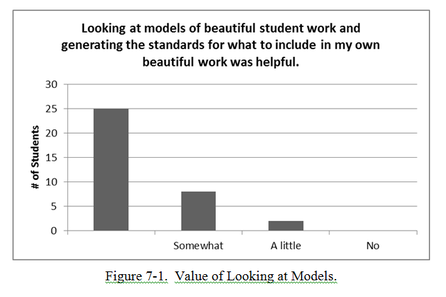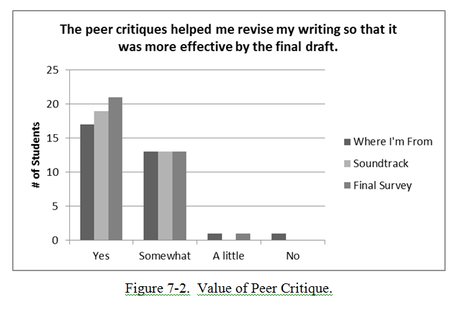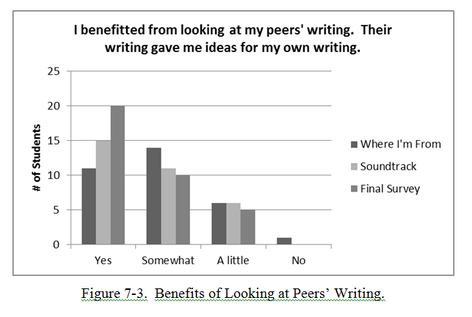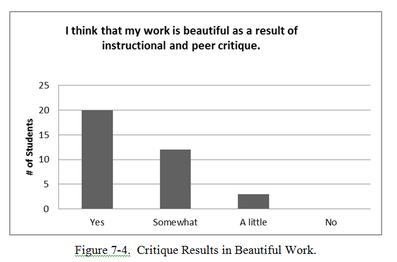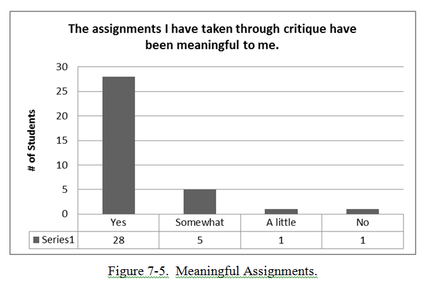Reaping the Harvest
My students took four projects through critique over the course of a school year. The first two projects are documented in this action research. In June, I gave students the survey whose findings are reported in Figures 6-9 through 6-12 I gave them one last survey to help me understand what effects they believed critique had on their work.
Was looking at models of beautiful students work and generating the standards for what to include in their own work helpful? 94% of the students found it was helpful to somewhat helpful. 6% of students said it was a little helpful. I don’t think most people can deny the benefit of looking at models. Models of beautiful work helped students chart a destination. Generating the standards by looking at these models helped students develop analysis skills which led them to internalize the criteria of beautiful work.
Figure 7-2 compares students’ responses to the statement “The peer critiques helped me revise my writing so that it was more effective by the final draft” across the first two critique cycles and the final survey at the end of the school year. While 53% found peer feedback helped them revise and create an effective final draft of “Where I’m From”, this percentage grew to 59% for the Personal Soundtrack and 60% after having participated in four critique cycles. 41% of students surveyed reported that peer feedback somewhat helped them revise and create an effective final draft for both the poem and the soundtrack. This percentage dropped to 37% at the end of the year, yet if you look at the actual survey chart, you can see that 13 students cited “Somewhat” for all three, but the number of students surveyed was different due to attendance. At the end of the year, 3%, or one student, felt that peer critique had little effect on revision and the final draft. Interestingly enough, the one student whose responses always showed up as an outlier on the surveys was the student who believed people are born smart versus people get smart by exerting effort. This same student often did not have his work during the critique cycles and the majority of the time only produced one draft.
At the end of the year 86% of students found looking at their peers’ writing was beneficial to somewhat beneficial in giving them ideas for their own work compared to 81% for the soundtrack and 78% for the poem. As students experience with critique grew, they begin to see that their peers could not only give them verbal advice, but their peers’ work could inform their own work. 19% of students found looking at others work only a little helpful for the “Where I’m From” poem and the soundtrack. This dropped to 14% at the end of the year. The truth is, we may not always benefit from looking at others’ writing, but if we can get one, two or three ideas of what to do, or what not to do, that is helpful.
Did instructional and peer critique support students in creating beautiful work? 91% of students believed their work was beautiful to somewhat beautiful as a result of instructional and peer critique. As the school year progressed and students gained more experience with critique I found them on a weekly, if not daily basis asking their peers for advice or clarification about the task at hand. This is what I wanted, students seeing each other as partners and collaborators in the production of beautiful work. While the majority of students did see critique’s worth, 9% found it to be only a little helpful. Again, when I followed up with the students who cited that critique was only a little helpful I found that these were typically students who were not prepared with drafts for peer critique and had a history of not doing their work. While I’d love to think that the assignments we took through critique were meaningful to all students, as you can see in Figure 6-17, two or 6% of students found the “Where I’m From”, Personal Soundtrack and the two other projects we took through critique not meaningful.
This year I crafted assignments that I believed were student centered and had a connection to students’ personal lives. Each piece students took through critique had an autobiographical element to it. After students turned in their Personal Soundtrack I asked them to tell me on an exit card what me what makes an assignment meaningful. Over and over again students wrote that assignments were meaningful when it was about their life. 80% of students found the assignments meaningful. 14% found them somewhat meaningful. 3% found them to be only a little meaningful and 3% found them not meaningful. I think what this tells me is that while I am definitely on the right track in providing meaningful curriculum, I need to provide students with more choices in the future. One of my focus students, Miranda, had even written this on an exit card. “What would make an assignment meaningful to me would be that it can relate to something you like, like when we did the Me Project we got to choose our form of writing. We should have more options on our assignments.” Choice is a definite draw for students and because my research focused on such a large topic, culture, it is one area that I did not give much attention to this year.
